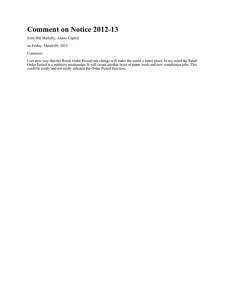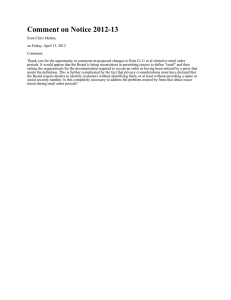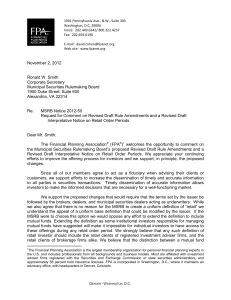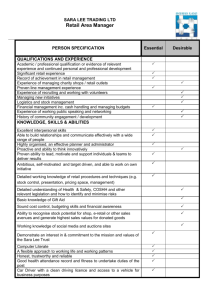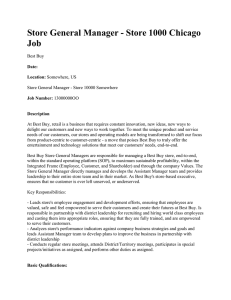November 2, 2012 Ronald W. Smith Corporate Secretary
advertisement
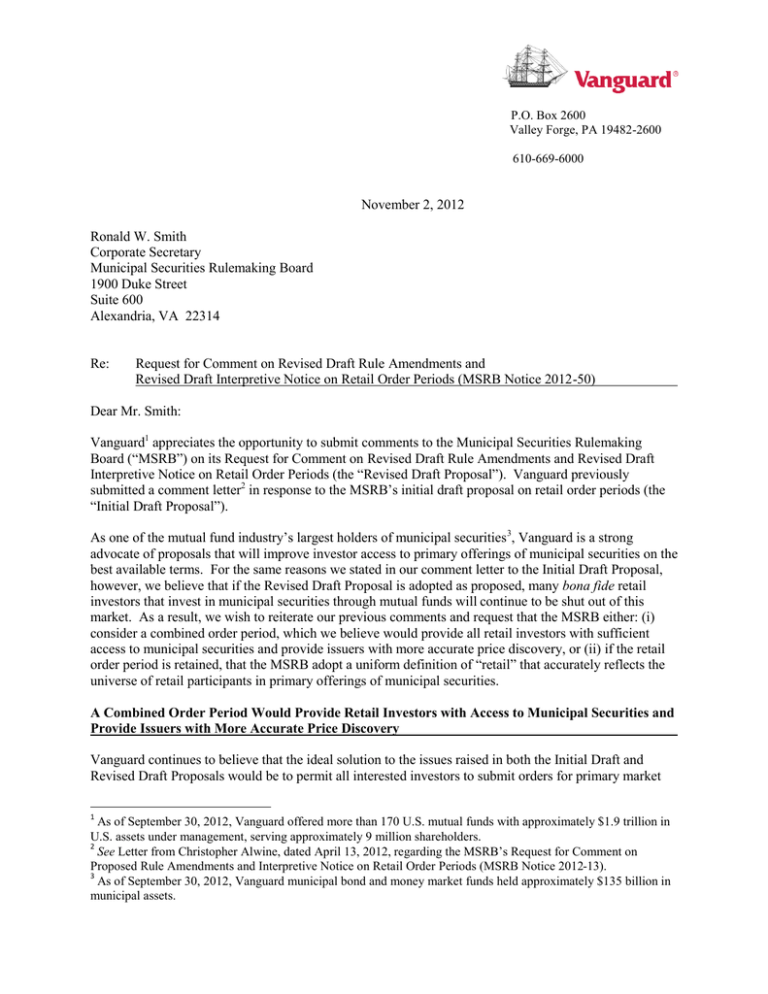
P.O. Box 2600 Valley Forge, PA 19482-2600 610-669-6000 November 2, 2012 Ronald W. Smith Corporate Secretary Municipal Securities Rulemaking Board 1900 Duke Street Suite 600 Alexandria, VA 22314 Re: Request for Comment on Revised Draft Rule Amendments and Revised Draft Interpretive Notice on Retail Order Periods (MSRB Notice 2012-50) Dear Mr. Smith: Vanguard1 appreciates the opportunity to submit comments to the Municipal Securities Rulemaking Board (“MSRB”) on its Request for Comment on Revised Draft Rule Amendments and Revised Draft Interpretive Notice on Retail Order Periods (the “Revised Draft Proposal”). Vanguard previously submitted a comment letter2 in response to the MSRB’s initial draft proposal on retail order periods (the “Initial Draft Proposal”). As one of the mutual fund industry’s largest holders of municipal securities 3, Vanguard is a strong advocate of proposals that will improve investor access to primary offerings of municipal securities on the best available terms. For the same reasons we stated in our comment letter to the Initial Draft Proposal, however, we believe that if the Revised Draft Proposal is adopted as proposed, many bona fide retail investors that invest in municipal securities through mutual funds will continue to be shut out of this market. As a result, we wish to reiterate our previous comments and request that the MSRB either: (i) consider a combined order period, which we believe would provide all retail investors with sufficient access to municipal securities and provide issuers with more accurate price discovery, or (ii) if the retail order period is retained, that the MSRB adopt a uniform definition of “retail” that accurately reflects the universe of retail participants in primary offerings of municipal securities. A Combined Order Period Would Provide Retail Investors with Access to Municipal Securities and Provide Issuers with More Accurate Price Discovery Vanguard continues to believe that the ideal solution to the issues raised in both the Initial Draft and Revised Draft Proposals would be to permit all interested investors to submit orders for primary market 1 As of September 30, 2012, Vanguard offered more than 170 U.S. mutual funds with approximately $1.9 trillion in U.S. assets under management, serving approximately 9 million shareholders. 2 See Letter from Christopher Alwine, dated April 13, 2012, regarding the MSRB’s Request for Comment on Proposed Rule Amendments and Interpretive Notice on Retail Order Periods (MSRB Notice 2012-13). 3 As of September 30, 2012, Vanguard municipal bond and money market funds held approximately $135 billion in municipal assets. Mr. Ronald W. Smith November 2, 2012 Page 2 of 3 municipal securities during a combined order period. This approach would fulfill the MSRB’s mandate to protect investors and issuers by providing market access to the millions of retail shareholders of municipal mutual funds while assisting issuers in determining the best price for their securities. We note that the MSRB did not address these comments in the Revised Draft Proposal. Retail mutual funds – which generally have very low shareholder investment minimums 4 – generally may not submit orders during the retail order period, while “professional retail” separately-managed accounts (SMAs) – which may invest on behalf of individuals but carry higher investment minimums – typically may participate. This result contravenes the intent of the retail order period, which purports to allow retail investors to purchase bonds before institutional investors. In fact, data from the Federal Reserve indicates that, since the first quarter of 2011, household ownership of individual municipal bonds has steadily declined. Over the same period, non-money market municipal mutual funds have experienced steady asset growth, indicating that retail investors may be seeking to benefit from the low investment minimums, diversification, and professional management offered by municipal mutual funds.5 This trend reinforces the notion that a combined order period would provide crucial access to the primary market for millions of bona fide retail investors. Further, municipal bond issues are often allocated to individual retail investors and SMAs prior to the submission of “institutional” orders by mutual funds and others, effectively limiting the access of millions of underlying retail investors to the primary market. In addition to precluding retail investors from accessing this market, this results in issuers failing to see the total demand – retail and institutional – for their securities, which may result in incomplete price discovery. A combined order period would permit issuers to evaluate the total demand for the bond issue and price bonds accordingly. If the Retail Order Period is Retained, the MSRB Should Adopt a Uniform Definition of Retail That Accurately Reflects Retail Participants in Primary Offerings of Municipal Securities In the Initial Draft Proposal, the MSRB noted concerns expressed by market participants that issuers were defining “retail” for purposes of retail order periods inconsistently. In response to these concerns, the MSRB specifically requested comment on whether it should adopt a uniform definition of “retail” for purposes of its retail order period rules. The MSRB received fourteen comment letters on the Initial Draft Proposal, with over half of those submitting comments, including Vanguard, advocating in favor of a standardized definition of “retail.”6 In the Revised Draft Proposal, however, the MSRB has indicated that it will leave the determination of the definition of “retail” for the purposes of a particular offering exclusively to the determination of an issuer. Vanguard believes that this result will only serve to perpetuate the concerns regarding the definition of “retail” that the MSRB itself noted when it specifically asked for comment on this issue. If left to the exclusive determination of issuers, it is likely that the definition of retail will continue to vary from offering to offering. Vanguard continues to believe and would like to reiterate that in order to avoid investor confusion and inconsistencies across the primary market, a standardized definition of “retail” should be adopted by the MSRB. This standard definition of “retail” should, at a minimum, give equal priority to the orders of “true” individual retail investors, such as those that invest via mutual funds with low investment 4 For example, the Vanguard municipal bond and money market funds require an investment minimum of $3,000. See Board of Governors of the Federal Reserve System, Flow of Funds Accounts of the United States, September 20, 2012, at 99. 6 See, e.g., Comment Letters of Vanguard, Wells Fargo Advisors, and the Investment Company Institute. 5 Mr. Ronald W. Smith November 2, 2012 Page 3 of 3 minimums, as orders submitted by “professional retail” purchasers, such as SMAs. If the MSRB does not adopt a standard definition of retail, and instead leaves this determination to the exclusive discretion of the issuer, then we would again suggest that offerings of bonds during the retail order period be limited to par coupon bonds. If the issuer truly chooses to favor the retail investor order, the par coupon structure is the preferred structure for these investors. Issuing par coupon bonds during the retail order period may also discourage flipping, as institutional investors would be generally less interested in these bonds. * * * * * Vanguard believes that these proposed alternatives – a combined order period or a standard definition of “retail” – are consistent with the MSRB’s mandate, as expanded under the Dodd-Frank Act, to protect both municipal issuers and investors. We commend the MSRB for seeking to address concerns regarding the retail order period and appreciate the opportunity to comment on the Revised Draft Proposal. If you have any questions about Vanguard’s comments or would like any additional information, please contact me at 610-669-6345. Sincerely, /s/ Christopher Alwine Christopher Alwine Head of Municipal Bond Group Vanguard cc: Lynette Kelly, Executive Director Municipal Securities Rulemaking Board
